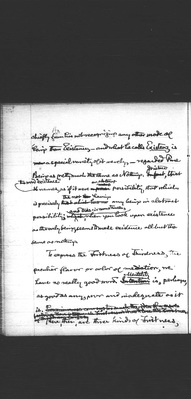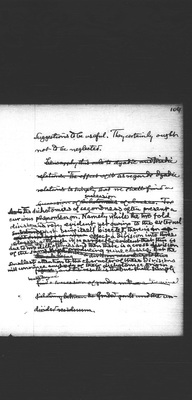Pages
71
chiefly from his not recognizing any other mode of being than Existence,— and what he calls Existenz is a special variety of it merely,— regarded Pure Being as pretty much the same as Nothing. It is true that the word “existence” names, as if it were mere an abstract possibility, that which is precisely the not having any being in abstract possibility; and this circumstance, when you look upon existence as the only being, seems to make existence all but the same as nothing.
To express the Firstness of Thirdness, the peculiar flavor or color of mediation, we have no really good word. Intention Mentality is, perhaps, as good as any, poor and inadequate as it is. Consciousness conveys too much the idea of a mere feeling. There is [??? much] Firstness in it as to lose the Firstness of Thirdness, largely
Here, then, are three kinds of Firstness,
72
102
subject to variations, and these variations, it has not been sufficiently remarked in connection with this difference of opinion, is quite indispensible to their regular action. I can hardly understand how there could be such a thing as an unchangeable habit. The great psychologist, Hume, said that the law of the association of ideas was a “gentle force.” It seems to me to be essentially so.
I dwell upon this rule of division, because, however it may be in other fields, in logic I am pretty sure that it invariably holds the divisions [it leads to are ??] the most important. At any rate, though I have never relied upon it, not seeing any clear reason why it should be so, and feeling sure that nothing in logic can be universally true without a reason, yet I have invariably found its
73
Qualitative Possibility, Existence, Mentality, resulting from applying Firstness to the three categories. We might strike new words for them: Primity, Secundity, Tertiality.
There are also three other kinds of firstness which arise in a somewhat similar way; namely, the idea of a simple original quality, the idea of a quality essentially relative, such as that of being “an inch long”; and the idea of a quality that consists in the way something is thought or represented, such as the quality of being manifest.
I shall not enter into any exact analysis of these ideas; for it would be a subject for a long course of lectures. I only wished to give you such slight glimpse as I could of the sort of questions that busy the student of phenomenology,
74
104
suggestions to be useful. They certainly ought not to be neglected.
Let us apply this rule to dyadic and triadic relations. The effect of it as regards dyadic relations is simply that we shall find a succession. The dichotomies of secondness often present a curious phenomenon. Namely while the two fold division is very evident, yet owing to the external part being itself bisected, there is in effect a division into three classes, although it is perfectly evident that this is due to two dichotomies and then there is a cross division of the same kind producing nine classes. But the smallest attention to the character of these divisions will convince anybody of their dichotomic origin and the result is that we shall simply find a succession of grades with one terminal dichotomy between the graded parts and the undivided residuum.
75
merely to lead up to Thirdness and to the particular kind and aspect of thirdness which is the sole object of logical study. I want first to show you what Genuine Thirdness is and what are its two degenerate forms. Now we found the genuine and degenerate forms of secondness by considering the full ideas of First and Second. Then the genuine Secondness was found to be ReAction, where First and Second are both true Seconds and the Secondness is something distinct from them, while in Degenerate Secondness, or mere Reference, the First is a mere First never attaining full Secondness.
Let us proceed in the same way with Thirdness. We have here a First, a Second, and a Third. The first is a Positive Qualitative Possibility, in itself nothing more. The Second is an Existent thing without any mode of being less than existence, but determined by that First




